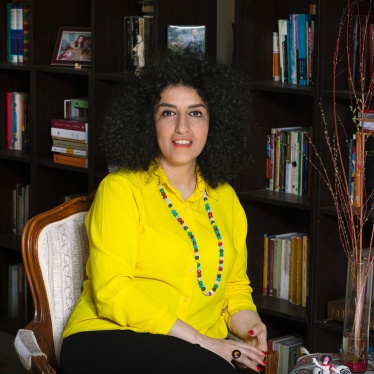(Beirut) – The Iranian authorities have arrested and detained the mother of one of the victims of the government’s violent crackdown on protests in 2009, Human Rights Watch said today. The authorities should immediately release Shahnaz Karimbeigi, who became an activist after her son was killed and has been in Evin prison since January 25, 2017, or promptly bring recognizable criminal charges against her and guarantee her a fair trial.
Karimbeigi’s 26-year-old son, Mostafa, was one of several protesters who were shot and killed during protests on December 27, 2009, linked to the disputed 2009 presidential election. Fifteen days after his disappearance, authorities directed the Karimbeigi family to the Kahrizak detention center morgue, where they identified Mostafa’s body, a source familiar with the case told Human Rights Watch. In the ensuing years, Karimbeigi has become a visible presence, demanding that the authorities identify and prosecute those responsible for her son’s death. Three weeks after her arrest, her family has not been informed of any reason for her detention.
“Arbitrarily detaining a woman who has repeatedly asked for justice for her son is simply shameful,” said Sarah Leah Whitson, Middle East director at Human Rights Watch. “The judiciary should focus on finding out who killed Shahnaz Karimbeigi’s son, instead of prosecuting her for peaceful activism.”
Authorities from the Intelligence Ministry arrested Karimbeigi at her workplace on the morning of January 25, and later that day searched her apartment and seized all her electronic devices, including her laptop. They also threatened Karimbeigi’s daughter and husband over the phone and summoned them for several hours of interrogation at the ministry’s “Follow-up Office” the next day, the source told Human Rights Watch. But it is not clear what charges Karimbeigi faces, and she has been denied access to a lawyer. Authorities had threatened, harassed, and briefly detained Karimbeigi several times before her arrest, the source said.
International law guarantees anyone accused of a crime access to a lawyer at all stages of criminal proceedings, including during the investigation, the pretrial proceedings, and during the trial itself. Iran’s 2014 criminal procedure law stipulates that anyone arrested should be given access to a lawyer while under investigation, with the exception of those accused of “national security crimes,” for whom such access could be delayed for up to a week. Article 48 of the law also requires people accused of national security offenses to select their counsel from a pre-approved pool of lawyers chosen by the head of the judiciary. The judiciary has yet to provide the list of pre-approved lawyers mandated by the new law, but even in the absence of a list, officials are effectively denying detainees’ access to legal defense and the right to be represented by a lawyer of their choice when they face national security crimes.
Since her son’s death, Karimbeigi had participated in several memorial gatherings with the mothers of other victims of the 2009 crackdown to demand justice for their loved ones, as well as organized public support for the families of imprisoned activists. Most recently, Karimbeigi was one of several advocates using social media campaigns to support Arash Sadeghi, a human rights defender serving a 15-year prison sentence in Evin prison.
In October 2016, Sadeghi began a hunger strike, which he ended in December, to protest his wife’s imprisonment. Golrokh Ebrahimi Iraee, Sadeghi’s wife, is serving a six-year sentence on charges of “insulting the sanctities of Islam” and “spreading propaganda against the state.”









